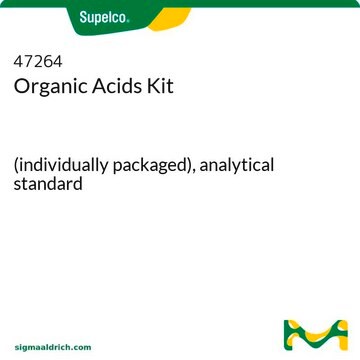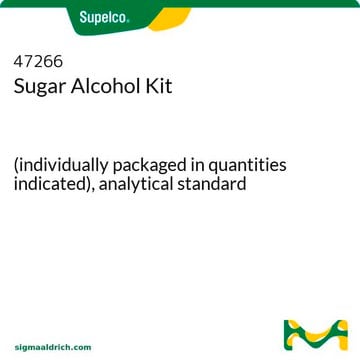ML0010
TCA Cycle Metabolite Library
Synonym(s):
Kreb′s Cycle Metabolite Library
About This Item
Recommended Products
storage temp.
−20°C
Application
- Reinforcing the Evidence of Mitochondrial Dysfunction in Long COVID Patients Using a Multiplatform Mass Spectrometry-Based Metabolomics Approach.: This study utilizes an advanced metabolomics approach to understand mitochondrial dysfunction in long COVID patients, highlighting the application of the TCA Cycle Metabolite Library for in-depth biological analysis (Martinez et al., 2024).
- OGDH and Bcl-xL loss causes synthetic lethality in glioblastoma.: This research explores the critical interactions in metabolic pathways, particularly the TCA cycle, affecting glioblastoma′s cellular metabolism and identifying potential therapeutic targets (Nguyen et al., 2024).
- The interactions and biological pathways among metabolomics products of patients with coronary heart disease.: Demonstrates how metabolomics, including TCA cycle metabolites, can reveal complex biochemical pathways in coronary heart disease, offering insights into potential interventions (Chu et al., 2024).
- Reduction in creatine metabolites in macrophages exposed to small molecule analogues of the anti-inflammatory parasitic worm product ES-62.: Investigates the impact of altered TCA cycle metabolites on macrophage biochemistry, providing a foundation for therapeutic research (Alanazi et al., 2024).
- In-vivo tracking of deuterium metabolism in mouse organs using LC-MS/MS.: This study applies cutting-edge analytical techniques to trace metabolic pathways in vivo, including key TCA cycle intermediates, which could be pivotal for clinical metabolic research (Kasarla et al., 2024).
Components
Preparation Note
Kit Components Also Available Separately
- A2056Acetyl coenzyme A trisodium salt, ≥93% (HPLC), powder 10 mgSDS
- C7129Citric acid monohydrate, reagent grade, ≥98% (GC/titration) 10 mgSDS
- F1506Sodium fumarate dibasic, ≥99% 10 mgSDS
- M1000L-(−)-Malic acid, ≥95% (titration) 10 mgSDS
- O4126Oxaloacetic acid, ≥97% (HPLC) 10 mgSDS
- P2256Sodium pyruvate, ReagentPlus®, ≥99% 10 mgSDS
- S1129Succinyl coenzyme A sodium salt, ≥85% 10 mgSDS
Signal Word
Warning
Hazard Statements
Precautionary Statements
Hazard Classifications
Eye Irrit. 2 - Skin Irrit. 2 - Skin Sens. 1 - STOT SE 3
Target Organs
Respiratory system
Storage Class Code
10 - Combustible liquids
Flash Point(F)
Not applicable
Flash Point(C)
Not applicable
Certificates of Analysis (COA)
Search for Certificates of Analysis (COA) by entering the products Lot/Batch Number. Lot and Batch Numbers can be found on a product’s label following the words ‘Lot’ or ‘Batch’.
Already Own This Product?
Find documentation for the products that you have recently purchased in the Document Library.
Customers Also Viewed
Articles
Fatty acid synthesis supports cancer cell proliferation, essential for membrane generation, protein modification, and bioenergetics.
Fatty acid synthesis supports cancer cell proliferation, essential for membrane generation, protein modification, and bioenergetics.
Fatty acid synthesis supports cancer cell proliferation, essential for membrane generation, protein modification, and bioenergetics.
Fatty acid synthesis supports cancer cell proliferation, essential for membrane generation, protein modification, and bioenergetics.
Our team of scientists has experience in all areas of research including Life Science, Material Science, Chemical Synthesis, Chromatography, Analytical and many others.
Contact Technical Service














